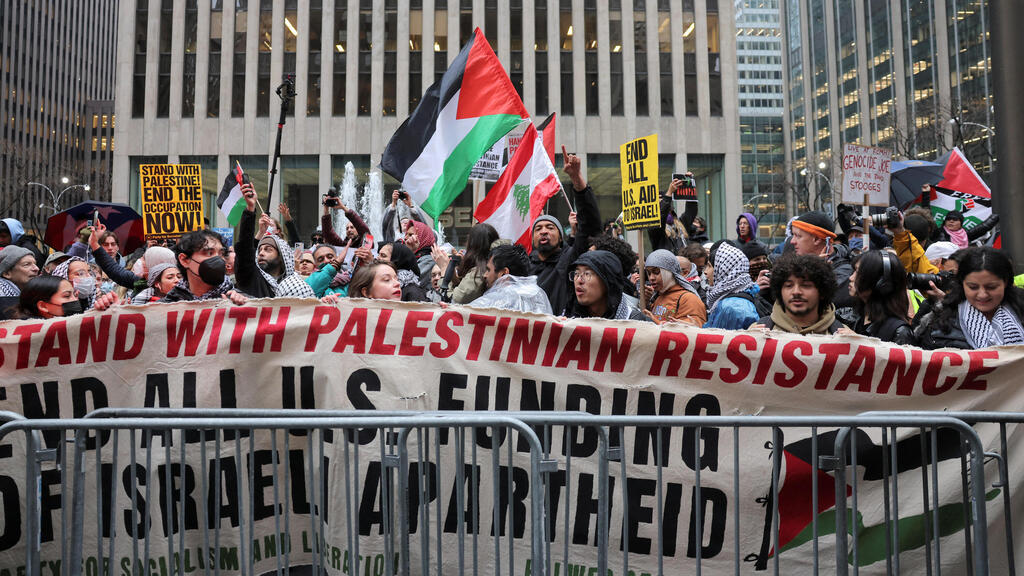Getting your Trinity Audio player ready...
In the aftermath of the October 7 massacre committed in Israel by Hamas, the world has seen the worst wave of antisemitic incidents since the end of World War II, according to an annual global antisemitism report issued Sunday. But in the nine months of 2023 before October 7 during which there were no major upheavals, most countries with significant Jewish populations saw a rise in the number of antisemitic incidents compared to the same period in 2022, including the United States, France, the United Kingdom, Australia, Italy, Brazil, The Netherlands and Mexico.
"This means that the war in Gaza helped spread a fire that was already out of control. And it was already out of control despite the significant efforts invested in recent years by governments on educational and legal initiatives aimed at reversing the trend," according to the Annual Antisemitism Worldwide Report, published by Tel Aviv University (TAU) and the Anti-Defamation League (ADL), which was released on Sunday ahead of Israel's Holocaust Remembrance Day, or Yom Hashoah.
4 View gallery


Antisemitic graffiti outside of the Israeli Embassy in Mexico
(Photo: StopAntisemitism)
The researchers reference the release of the annual report tracking antisemitic acts ahead of Yom Hashoah. "The distress and danger Jews currently experience should not be overstated. This is not 1939, let alone 1942, not anywhere. Yet while being attacked or harassed has not been the experience of most Jews outside Israel, the data indicate that if current trends persist and continue to deteriorate, the curtain will descend on the ability of Jewish identities to be manifested with security and freedom in the West," they write in the report.
The report notes that, often, those committing antisemitic acts or making antisemitic statements say that their problem is with Israel and not Jews, even as they target Jewish individuals, institutions and symbols. And it is tempting to look at the wave of antisemitism that took place post-October 7 as an emotional reaction to the scenes of death and destruction coming out of Gaza since the start of the Israel Defense Forces ground operation. But, according to the report, "some of the most outrageous antisemitic expressions in the context of the conflict were articulated in the first days following October 7, before Israel had begun its military campaign."
The report acknowledges that criticizing Israel is not antisemitism. "Seeking its elimination as the national home of the Jewish people, including through the false argument that it is an unlawful colonial enterprise, is antisemitic," it says.
Among the countries that saw large increases in antisemitism in 2023 compared to the previous year are the United States, France, the UK, Australia, Italy, Brazil, the Netherlands and Mexico.
4 View gallery


Neo-Nazis on the streets of the city of Madison, Wisconsin, in 2023
(Photo: X platform)
ADL’s annual audit of antisemitic incidents in the United States catalogued 7,523 incidents in 2023, compared to 3,697 incidents in 2022 and 2,717 in 2021.They are the highest numbers the ADL has ever recorded and the third straight year of registering a record high. According to the report, in New York, the city with the largest Jewish population in the world, the New York Police Department recorded 325 anti-Jewish hate crimes in 2023 compared to the 261 it recorded in 2022; the Los Angeles Police Department recorded 165 incidents compared to to 86 the prior year, and the Chicago Police Department logged 50 incidents in 2023, rising from 39 in 2022. The ADL recorded 7,523 incidents in 2023 compared to 3,697 in 2022 (and according to a broader definition applied, it recorded 8,873); the number of assaults increased from 111 in 2022 to 161 in 2023 and of vandalism from 1,288 to 2,106.
In France, the number of incidents increased from 436 in 2022 to 1,676 in 2023 (the number of physical assaults increased from 43 to 85); in the UK from 1,662 to 4,103 (physical assaults rose from 136 to 266); in Argentina from 427 to 598; in Germany from 2,639 to 3,614; in Brazil from 432 to 1,774; in South Africa from 68 to 207; in Mexico from 21 to 78; in the Netherlands from 69 to 154; in Italy from 241 to 454; and in Austria from 719 to 1,147. Australia recorded 622 antisemitic incidents in October and November 2023, in comparison to 79 during the same period in 2022.
The 150-page report includes in-depth essays of the atmosphere and rise in antisemitism in different countries, as well as a study on the profiles of the spreaders of antisemitic content on the X social media platform. The essays examine, among other issues, the proliferation of antisemitic discourses in the Arab world, Turkey and Iran following October 7 and trace their roots.
Also presented in the report is a historical and political analysis of the development of present-day antisemitism and a detailed 11-point plan for globally combatting the phenomenon by former Canadian Justice Minister and Attorney General Irwin Cotler.
Dr. Carl Yonker, senior researcher and project manager at the Center for the Study of Contemporary European Jewry, at Tel Aviv University, wrote for the report on the topic of antisemitism in the United States. "Contrary to the conventional wisdom, post-October 7 incidents were also led from the far right in America. Neo-Nazis, white supremacists and others glorified Hamas and used the war to spread antisemitic propaganda along with conspiracy theories, according to which the crisis will advance the replacement of the white majority in the West by migrants from the Middle East. The fringes in the United States are encroaching on the political center from both right and left, making combatting antisemitism much trickier," he notes.
"With bomb threats against synagogues becoming a daily occurrence, Jewish existence in the West is forced to fortify itself, and the more it does so, the more the sense of security and normalcy is undermined. What the fight against antisemitism needs now is efforts focused on the hubs of poison, and the presentation of measurable and attainable goals. Foremost, the reality in which big companies make big money by spreading big hate has to end," according to Professor Uriya Shavit, head of The Center for the Study of Contemporary European Jewry and the Irwin Cotler Institute.
Shavit also adds that "one of the biggest challenges of our time is how to mobilize support for the fight against antisemitism without making it the definer of Jewish identity."
4 View gallery


Pro-Palestinian demonstrations in New York justify terrorism and even explicitly support it
(Photo: Reuters/Andrew Kelly )
ADL’s CEO and National Director Jonathan Greenblatt described the aftermath of the October 7 massacre in Israel as "a tsunami of hate against Jewish communities worldwide."
"Antisemitism isn’t just an abstract issue. It is a real-life threat to Jewish life in America and Jews around the world, and our history teaches us that we do not have the luxury to be indifferent when moments like these occur," Greenblatt writes in an essay in the report. "That means we need to be clear-eyed about the threats we face and have the determination to confront them."


